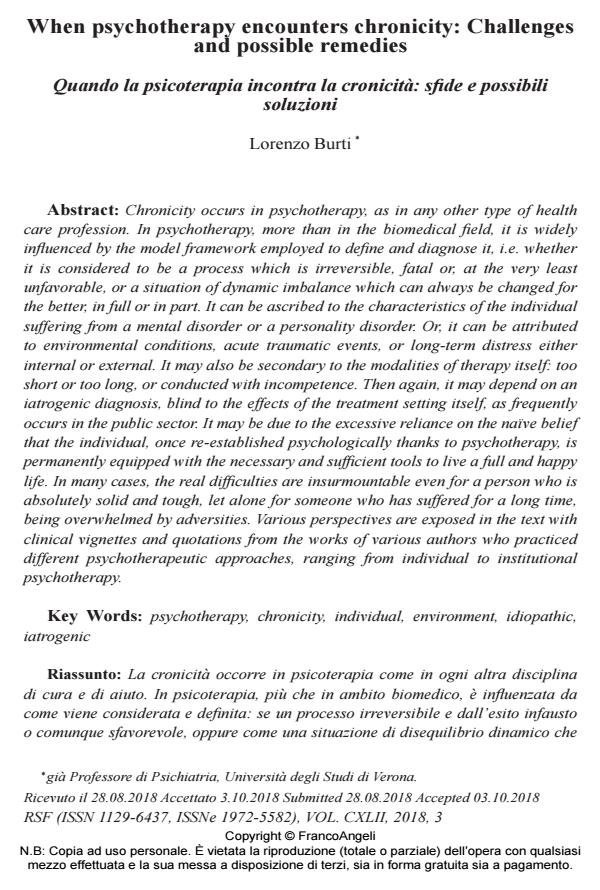When psychotherapy encounters chronicity: Challenges and possible remedies
Journal title RIVISTA SPERIMENTALE DI FRENIATRIA
Author/s Lorenzo Burti
Publishing Year 2018 Issue 2018/3
Language English Pages 20 P. 97-116 File size 1854 KB
DOI 10.3280/RSF2018-003006
DOI is like a bar code for intellectual property: to have more infomation
click here
Below, you can see the article first page
If you want to buy this article in PDF format, you can do it, following the instructions to buy download credits

FrancoAngeli is member of Publishers International Linking Association, Inc (PILA), a not-for-profit association which run the CrossRef service enabling links to and from online scholarly content.
Chronicity occurs in psychotherapy, as in any other type of health care profession. In psychotherapy, more than in the biomedical field, it is widely influenced by the model framework employed to define and diagnose it, i.e. whether it is considered to be a process which is irreversible, fatal or, at the very least unfavorable, or a situation of dynamic imbalance which can always be changed for the better, in full or in part. It can be ascribed to the characteristics of the individual suffering from a mental disorder or a personality disorder. Or, it can be attributed to environmental conditions, acute traumatic events, or long-term distress either internal or external. It may also be secondary to the modalities of therapy itself: too short or too long, or conducted with incompetence. Then again, it may depend on an iatrogenic diagnosis, blind to the effects of the treatment setting itself, as frequently occurs in the public sector. It may be due to the excessive reliance on the naïve belief that the individual, once re-established psychologically thanks to psychotherapy, is permanently equipped with the necessary and sufficient tools to live a full and happy life. In many cases, the real difficulties are insurmountable even for a person who is absolutely solid and tough, let alone for someone who has suffered for a long time, being overwhelmed by adversities. Various perspectives are exposed in the text with clinical vignettes and quotations from the works of various authors who practiced different psychotherapeutic approaches, ranging from individual to institutional psychotherapy.
Keywords: Psychotherapy, chronicity, individual, environment, idiopathic, iatrogenic
Lorenzo Burti, When psychotherapy encounters chronicity: Challenges and possible remedies in "RIVISTA SPERIMENTALE DI FRENIATRIA" 3/2018, pp 97-116, DOI: 10.3280/RSF2018-003006